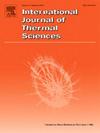Thermo-hydraulic performance enhancement in novel secondary connected fractal heat sink with cavities
IF 4.9
2区 工程技术
Q1 ENGINEERING, MECHANICAL
International Journal of Thermal Sciences
Pub Date : 2025-03-20
DOI:10.1016/j.ijthermalsci.2025.109855
引用次数: 0
Abstract
The flexible geometries of microchannel heat sinks (MCHS) allow for modified cooling solutions for a wide range of applications. This adaptability enables heat dissipation enhancement in a variety of sectors, including renewable energy systems and microelectronics. This study aims to build novel MCHS device for thermo-hydraulic performance enhancement. Two devices are, bottom cavities secondary connected fractal heat sink with one branching level (BCSC-FHS-L1) and two branching level (BCSC-FHS-L2), 3D printed by laser powder bed fusion (LPBF) technique. AlSi10Mg alloy is used as solid substrate and water as fluid with single-phase flow. Their performances are studied numerically and validated experimentally using an in-house developed test setup. BCSC-FHS-L2 shows superior thermal performance with the maximum enhancement of 35% in average Nusselt number () at Reynolds number ()=793 with 67% increment in pressure drop (). BCSC-FHS-L2 shows the maximum overall performance () at =270 with 17% enhancement compared to BCSC-FHS-L1 device.
新型带腔二次连通分形散热器的热水力性能增强
微通道散热器(MCHS)的灵活几何形状允许修改冷却解决方案,适用于广泛的应用。这种适应性使各种部门的散热增强,包括可再生能源系统和微电子。本研究旨在建立一种新型的MCHS装置,以提高热液性能。采用激光粉末床熔融(LPBF)技术进行3D打印的两种器件分别是一分支级(bscc - fhs - l1)和两分支级(bscc - fhs - l2)的底腔二次连通分形散热器。以AlSi10Mg合金为固体基材,水为单相流动流体。利用内部开发的测试装置对其性能进行了数值研究和实验验证。BCSC-FHS-L2表现出优异的热性能,在雷诺数(Re)=793时,平均努塞尔数(Nuavg)最大增强35%,压降增加67% (ΔP)。与BCSC-FHS-L1相比,BCSC-FHS-L2在Re=270时显示出最大的整体性能(OP),提高了17%。
本文章由计算机程序翻译,如有差异,请以英文原文为准。
求助全文
约1分钟内获得全文
求助全文
来源期刊

International Journal of Thermal Sciences
工程技术-工程:机械
CiteScore
8.10
自引率
11.10%
发文量
531
审稿时长
55 days
期刊介绍:
The International Journal of Thermal Sciences is a journal devoted to the publication of fundamental studies on the physics of transfer processes in general, with an emphasis on thermal aspects and also applied research on various processes, energy systems and the environment. Articles are published in English and French, and are subject to peer review.
The fundamental subjects considered within the scope of the journal are:
* Heat and relevant mass transfer at all scales (nano, micro and macro) and in all types of material (heterogeneous, composites, biological,...) and fluid flow
* Forced, natural or mixed convection in reactive or non-reactive media
* Single or multi–phase fluid flow with or without phase change
* Near–and far–field radiative heat transfer
* Combined modes of heat transfer in complex systems (for example, plasmas, biological, geological,...)
* Multiscale modelling
The applied research topics include:
* Heat exchangers, heat pipes, cooling processes
* Transport phenomena taking place in industrial processes (chemical, food and agricultural, metallurgical, space and aeronautical, automobile industries)
* Nano–and micro–technology for energy, space, biosystems and devices
* Heat transport analysis in advanced systems
* Impact of energy–related processes on environment, and emerging energy systems
The study of thermophysical properties of materials and fluids, thermal measurement techniques, inverse methods, and the developments of experimental methods are within the scope of the International Journal of Thermal Sciences which also covers the modelling, and numerical methods applied to thermal transfer.
 求助内容:
求助内容: 应助结果提醒方式:
应助结果提醒方式:


